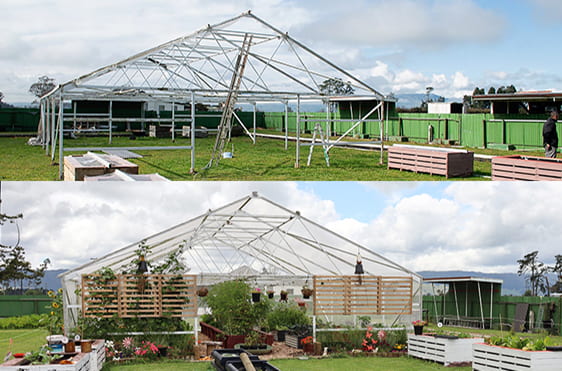Regenerative Place-making Design: coupling social food reconnection with pollinator biodiversity in the public space
It’s getting warm, biodiversity loss is ubiquitous, and people are getting sick. The conundrum that justifies this action research agenda has been measured and documented over the past decades. Our team received two grants to create real-world experiments for disrupting the status quo. These disruptions constitute edible green infrastructure to help tackle climate change while supporting healthier diets and pollinator biodiversity in the public space.
This research started from a vision of an alternative future in which children climb fruit trees, and people are welcome to harvest food for a meal as part of their lived experience in parks and other public spaces. We intentionally divert from the community garden model, where gardeners incorporate food ownership narratives due to their invested labour, to co-design and collaboration in which food as a public service embodies the permission to harvest and eat the produce grown by someone else.
This project is grounded in repurposing public land that would otherwise function as parking or ornamental landscapes. We are activating public spaces into dynamic knowledge platforms, by growing edible landscapes to reconnect people with food processes while supporting populations of pollinators (Ribeiro 2019). Local residents engage in planting and harvesting and take food home to share with family and friends, turning food into a public service for people and pollinators, rather than a product to be consumed (Ribeiro 2020).
Implementations
The first implementation of this regenerative place-making strategy was a small-scale intervention at Auckland’s Monarch Park in 2020-21. This starting point resulted from a combination of politics, media exposure, and transdisciplinary cooperation with a local council planner and geospatial scientists. The planner used the Project Lead’s publications in his successful submission to the Kaipātiki Local Board (Ribeiro 2019; Ribeiro 2020a; Ribeiro 2020b). Monark Park was significant because it proved that change is possible and financially inexpensive provided there is political will.
In 2022-23, the research team co-designed and helped to implement this regenerative place-making strategy at a 400m2 site in Waharoa, New Zealand, in partnership with a local council and a community group comprised of Māori, the indigenous peoples of Aotearoa-New Zealand. The Waharoa site is a living lab and proof of concept of a pathway for change that could be upscaled nationally and internationally, while concurrently re-energising local Iwi. It required a methodology for stakeholder engagement due to its core components: access to public land (local government’s remit), the partnership with a group keen to manage the edible landscape (which they consider a pathway for reconnecting Māori former prisoners and rangatahi with whanau), and the research team who led the engagement, structured the project and sponsored the planting supplies.
Additional information
• Because of this research, the Project Lead was invited to feature in the Taylor and Francis’ Sustainable Cities series: https://www.linkedin.com/feed/update/urn:li:activity:6963330981739057152/
Publications:
Ribeiro, B. 2019. From Food Consumption to Eating Awareness. Focus: the journal of planning practice and education 15(1), pp. 56–66. https://digitalcommons.calpoly.edu/focus/vol15/iss1/14/
Ribeiro, B. 2020a. Circular Place-making in Auckland: Enhancing pollinators’ biodiversity and food awareness. Auckland Council., pp. 4–5. Available at: https://knowledgeauckland.org.nz/media/1344/mrq-12december-2019.pdf
Ribeiro, B. 2020b. Sustainability Transitions in New Zealand: Mainstreaming alternative food values. PhD Thesis, Auckland, New Zealand: The University of Auckland. Available at: https://researchspace.auckland.ac.nz/handle/2292/53687
Ribeiro, B. and Lewis, N. 2021. Urban food forestry networks and Urban Living Labs articulations. Journal of Urbanism: International Research on Placemaking and Urban Sustainability 0(0), pp. 1–19. https://www.tandfonline.com/doi/full/10.1080/17549175.2021.1906731
